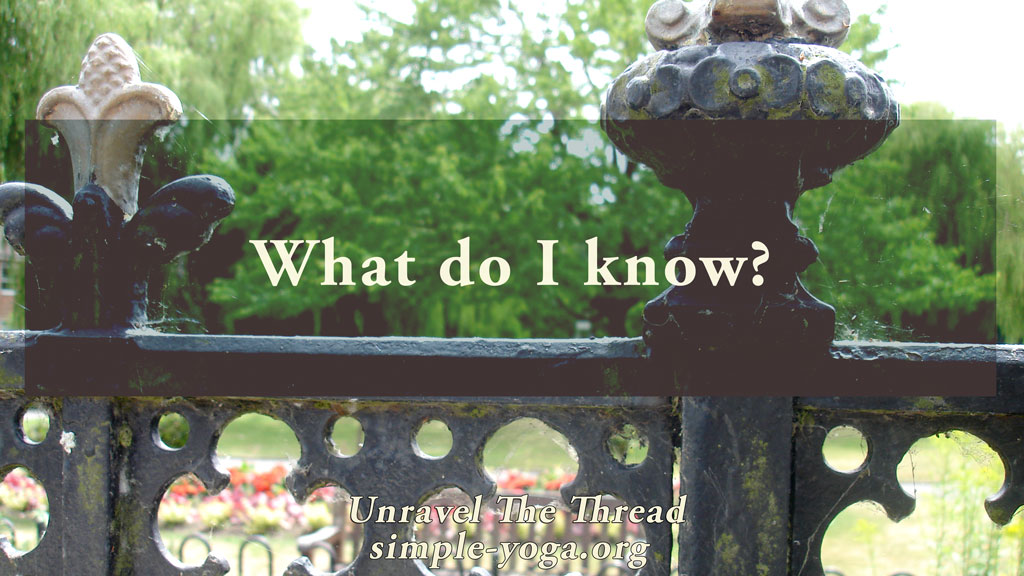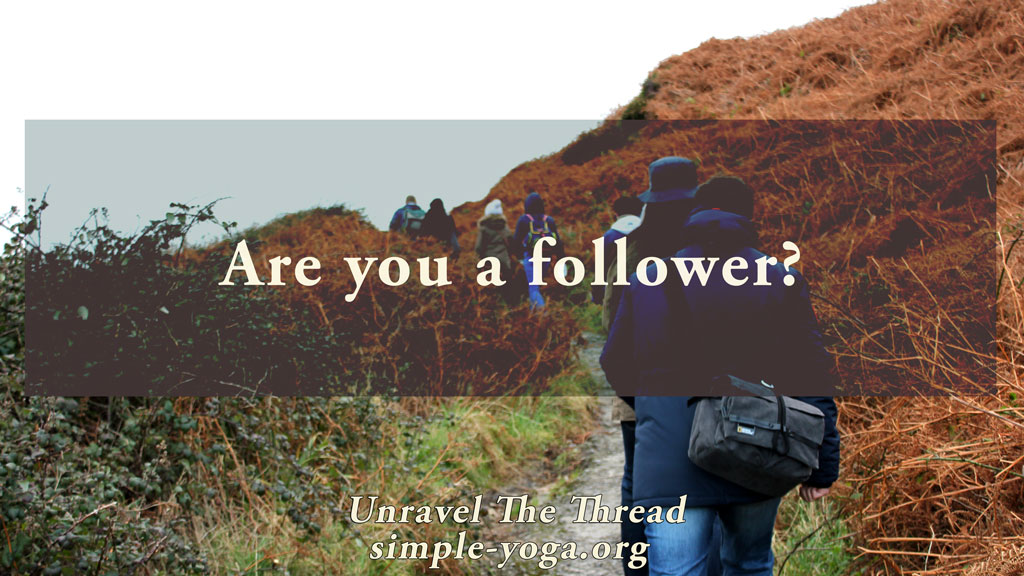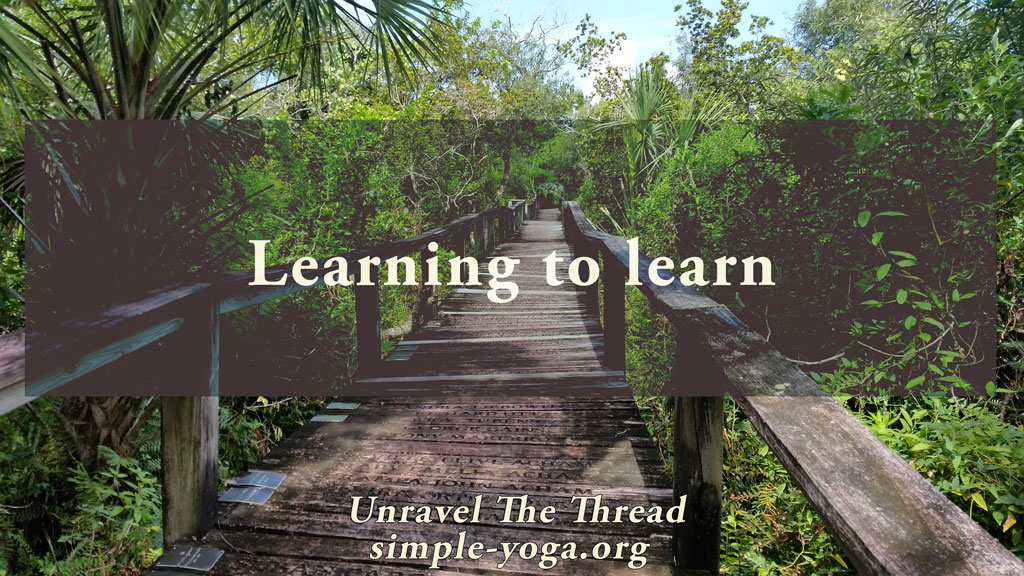
What do I know?
April 24, 2023
Are you a follower?
May 8, 2023
What do I know?
April 24, 2023
Are you a follower?
May 8, 2023Learning to learn

Learning to learn
We just spent some time and energy thinking about knowledge by exploring questions like, what do I know? How do I know what I know? Is what I know true? Does my knowledge align with common sense? Is my knowledge applicable in my everyday life?
Exploring these questions on a daily basis may help us recognize that our knowledge is not static. Of course, it isn’t! Pausing and noticing helps recognize the fact that our body, our thoughts, our emotions, and our interests are changing, they have not remained the same throughout our lives. In addition, the world around us is in a continuous process of transformation. We are immersed in an ocean of constant change happening within and without.
For some of us there may be a tendency to want something to stay fixed, unchanging. Like when we figure out how something works. There is a sense of accomplishment and a sense of relief because there is one thing that we know. So, it may be frustrating when we start noticing that everything is in flux.
However, the essence of life is continuous change. Reflecting on our memories confirms that everything has been changing around and within us. Indeed, noticing this fact right here and now provides confirmation that we have been able to navigate the currents of life. Even when we have felt confused, somehow, we have been able to resolve our confusion and disorientation. We have been able to adapt to the changing circumstances, sometimes more gracefully than others, but we have been able to, otherwise we wouldn’t be here.
Although we would like to pretend that we are good are predicting it can be useful to consider if you would have been able to make an accurate prediction about your life six months, one year or five years ago. Life is ever changing in unpredictable ways. This fact frees us up from having to pretend that we can control the world outside of us. It also confronts us with the fact that we will go through moments of tolerable discomfort.
I wish the process of learning would have been explained to me at some point in time. It never was. The instruction was simple, just study. Or concentrate. That was it. I am aware that there are many people who are smarter than me that probably had enough information with that instruction to be adept at learning. It took me decades to recognize how the process of learning really worked for me, and that completely changed my approach to learning and made me better at learning. Yoga, as a practice of self-reflection and self-understanding (svadhaya) made it easier to notice the patterns in the process of learning.
The essence of learning is tolerable discomfort. You start with your interest and motivation about a specific topic or skill. Then you try to understand and practice. What I wish had been made explicit to me was that learning is the process of reaching the boundaries of our understanding. And that is a process that generates tolerable discomfort. It does not hurt, but it may feel like confusion, frustration and perhaps irritation. These are signs that we do not understand completely what we are trying to do. With good guidance and meaningful practice, we identify tolerable discomfort as a necessary step in moving from not knowing to knowing. Instead of it being a sign that we are not good or that we are stupid, the tolerable discomfort we feel confirms that we are exploring the boundaries of our knowledge and that we are on the brink of discovery.
Learning is putting together a map for our life. Some of our past experiences are very clearly documented, while others may be fuzzy. We are currently coloring the stage of our life that we are going through. There are parts that are not filled in at all. Yes, it can be disconcerting to look at the map and see no guidance. This is where a trustworthy guide or teacher can be helpful. On our side it is valuable to identify tolerable discomfort as feedback that indicates that we are learning. If, instead, we see the discomfort of learning as a sign of failure, we may feel tempted to abandon the process. When we experience tolerable discomfort, we can use it to empower us to harness the energy that otherwise would be wasted in the form of irritation or frustration. What happens when we see irritation or frustration as both confirmation that we are learning and an invitation to invest that energy into finding different options that we had not thought about before? Could this be a very effective way to fill in a new portion of the map?
Bringing it all together, it is important to understand what we know and how we know it, favoring direct experience and common sense. We recognize that knowledge is dynamic, it changes, because everything is changing all the time. Since life does not repeat itself, it is not possible to predict accurately, and it makes no sense to try to do so. So, instead of pretending that our knowledge is already complete, it is in our own best interest to get really good at learning by remembering that all learning will, by definition, help us transcend our current views and understanding, and thus, in the process we are going to feel uncomfortable. The better we are at managing this discomfort the more effective our learning and the more likely it is that we will continue learning for the rest of our lives.
When we understand the process of learning it is much easier to go from information to knowledge, then to mastery and eventually to wisdom.
This week I invite you to reflect on your past experiences to discover if all meaningful learning involves tolerable discomfort. Then pay attention to what you are trying to learn now. How are you going about it? Where do you find obstacles? What do you feel when you have not succeeded yet? What are the characteristics of tolerable discomfort for you? What are the differences between tolerable discomfort and pain? Can you turn the energy from tolerable discomfort into motivation to continue learning?
If you prefer, you may listen to the podcast:
This is an excerpt from the book Unravel the thread: Applying the ancient wisdom of yoga to live a happy life
If you find Simple-Yoga.org and Unravel the thread useful, consider supporting my labor with a donation, you may also donate using PayPal or Venmo. Thank you!
